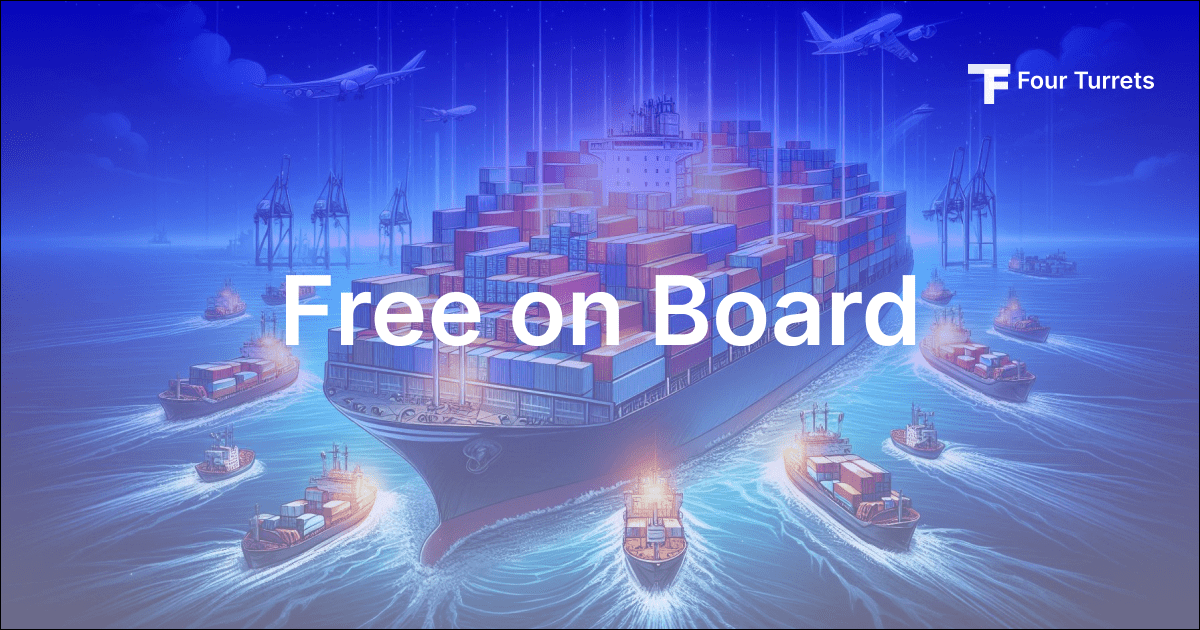What is Free on Board (FOB)?
Free on Board (FOB) is an Incoterms used primarily in international trade to indicate the point at which the responsibility for the goods is transferred from the seller to the buyer. Under the FOB shipping point (or FOB origin) designation, the seller pays for the shipment only up to the shipping point. From the seller’s shipping dock or port of shipment, the buyer is responsible for shipping costs and assumes the risk of loss of goods in transit afterward. The goods are considered transferred to the buyer once they board the vessel.
On the other hand, under CIF destination terms, the seller pays for the shipment to the final destination and retains the risk of loss until the goods have been delivered to the buyer’s location.
Different variations like FOB shipping point and FOB destination illustrate the conditions under FOB terms and highlight the importance of clarity in international shipping. The point at which ownership of the goods and risks transfer can significantly affect payment terms. Organizations often adhere to contracts validated by the International Chamber of Commerce to mitigate confusion. Understanding the distinctions between FOB origin and FOB destination is crucial for entities engaged in the shipping industry.
Additional terms related to FOB include free carrier (FCA), where the seller’s responsibilities end when the goods are delivered to the agreed carrier at a specified location, and free alongside (FAS), which designates that the seller must deliver the goods alongside the shipping vessel at the port.
Understanding Free on Board
The FOB term indicates that the seller fulfills their obligation to deliver when the goods have passed over the ship’s rail at the named port of shipment. This means the buyer has to cover costs from there, including transportation, insurance, and unloading. The risk shifts from the seller to the buyer once the goods are on board the vessel. Mastering the nuances of FOB (freight on board) can significantly impact cost management and logistics efficiency in international trade transactions.
Majority of export and import companies select FOB for business, as it gives flexibility to both seller and buyer to manage their risks and control cost for freight and customs clearance on their respective countries.
Other Incoterms
Incoterms, or International Commercial Terms, are essential guidelines in global trade that define responsibilities and risks between buyers and sellers. Besides Free on Board (FOB), other significant terms include Ex Works (EXW), where the seller makes goods available at their premises, and the buyer bears all risks and costs from that point forward. Another key term is Cost, Insurance, and Freight (CIF), which requires the seller to cover the costs, insurance, and freight necessary to bring goods to a specified port of destination.
Additionally, Delivered Duty Paid (DDP) provides maximum seller responsibility, ensuring that the seller covers all costs and risks, including duties, until the buyer receives the goods. Conversely, FCA (Free Carrier) minimizes the seller’s responsibility to deliver the goods to a carrier or another party nominated by the buyer, who then takes over all subsequent costs and risks.
Difference Between FOB and CIF
The primary difference between FOB and CIF lies in who assumes responsibility and costs at different stages of the shipping process. FOB (Free on Board) means that the seller is responsible for the goods until they are loaded onto the shipping vessel. Once on board, the risk and costs transfer to the buyer. This includes shipping, insurance, and import duties.
On the other hand, CIF (Cost, Insurance, and Freight) places more responsibility on the seller. Under CIF terms, the seller covers the cost of the goods, as well as the insurance and freight to bring the goods to the buyer’s designated port. The risk transfers to the buyer once the goods are on the ship, but the seller still pays for the shipping costs and insurance.
In essence, the main distinction is when the risk and cost pass from the seller to the buyer. FOB means the buyer takes on costs and risks earlier, while CIF involves the seller covering more until the goods reach the destination port.
Working in International trade and finding it difficult to find clients? Come, work with Four Turrets.







